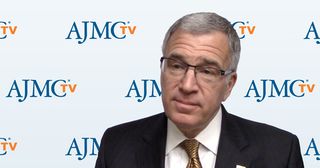
Oncology
Latest News

Latest Videos

CME Content
More News

This week, the top managed care news included final numbers for 2018 enrollment in Affordable Care Act plans; an increase in Medicare Advantage payments; National Public Health Week highlighted the importance of community relationships in improving health.

Thomas Graf, MD, chief medical officer and vice president, Horizon Blue Cross Blue Shield of New Jersey, discusses the impact of new therapies on private insurance coverage for cancer patients.

Oral anticancer medications are frequently used to treat patients with cancer. We found significant time and energy burdens for clinic staff and patients in obtaining these drugs.

Researchers have been trying to find a way to screen populations at high risk of developing a precursor condition to multiple myeloma in order to intervene early and reduce disease prevalence and mortality.

New research suggests that the composition of bacteria in the gastrointestinal tract may help predict which patients with cancer may benefit most from adoptive T-cell immunotherapy, including chimeric antigen receptor T-cell therapy.

Dr Sean C. Dowdy: Reducing Opioid Abuse in Patients Undergoing Surgery for Gynecologic Malignancies
It’s important to emphasize that this is not an opioid crisis, it’s a prescription opioid crisis, said Sean C. Dowdy, MD, chair, division of gynecologic surgery, department of obstetrics and gynecology, Mayo Clinic.

Enrollment for 2018 in Affordable Care Act plans is only slightly below figures from 2017; a rare breed of antibiotic-resistant bacteria is spreading in hospitals; a new company will develop off-the-shelf CAR T-cell therapies that do not need to be personalized to the patient.

Physicians using molecular therapies need to be educated on where the therapies are best used during treatment, and patients need to understand that the radiation is safe for those around them, said Joe O'Sullivan, MD, FRCR, clinical professor, School of Medicine, Dentistry and Biomedical Sciences, Queen's University Belfast.

Following the American Society of Clinical Oncology's (ASCO's) evaluation of leading oncology clinical pathway vendors nationwide, an article in Journal of Clinical Pathways provided insight into the evaluation from 2 of the report's co-authors.

Thomas LeBlanc, MD, of the Duke Cancer Institute, discusses how palliative care has evolved over the past decade for patients with blood cancers.

Every week, The American Journal of Managed Care® recaps the top managed care news of the week, and you can now listen to it on our podcast, Managed Care Cast.

This week, the top managed care stories included another insurer announcing it would pass on drug rebates to consumers; FDA approved a new continuous glucose monitor and created a new medical device class; new guidelines address how to treat people with both HIV and cancer.

Coverage of our peer-reviewed research and news reporting in the healthcare and mainstream press.

The National Comprehensive Cancer Network (NCCN)’s 23rd Annual Conference, held March 22-24 in Orlando, Florida, brought together stakeholders from across the oncology landscape. Here are 5 key takeaways from the meeting.

A clear majority of patients with cancer experience some sort of financial hardship, and the cost of care is something that weighs on the minds of patients and their families right from the moment of diagnosis, said Todd Yezefski, MD, senior fellow in the Clinical Research Division at the Fred Hutchinson Cancer Research Center and Division of Medical Oncology at the University of Washington.

Despite having higher rates of insurance coverage and more education, cancer survivors were more likely to report difficulties accessing and affording care than adults with no reported history of cancer.

With more oncology patients receiving oral therapies, the pharmacist plays an important role in patient education and follow-up, said Stacey McCullough, PharmD, senior vice president of pharmacy at Tennessee Oncology.

mTOR is a very promising pathway because it’s so central in growth, migration, and survival of bladder cancer cells, explained Donna Hansel, MD, PhD, chief, anatomic pathology, UC San Diego.

On the closing day of the National Comprehensive Cancer Network (NCCN) 23rd Annual Conference in Orlando, Florida, Bijal Shah, MD, of Moffitt Cancer Center, presented on acute lymphoblastic leukemia (ALL), and on the lessons learned from the application of chimeric antigen receptor (CAR) T-cell therapy in this indication.

High costs in cancer care not only affects treatment outcomes for patients, but also their overall quality of life, explained Michele McCourt, senior director of the CancerCare Co-Payment Assistance Foundation.

At the Society of Gynecologic Oncology’s 2018 Annual Meeting on Women’s Cancer, 1 abstract found Patient-Centered Oncology Payment model would yield savings if hospitalizations were reduced, while another abstract piloted a scoring system for financial toxicity in gynecological cancers.

Despite price tags well over $350,000 for treatment, tisagenlecleucel, approved for children with B-cell acute lymphoblastic leukemia, and axicabtagene ciloleucel, approved for adults with certain B-cell subtypes of non-Hodgkin lymphoma, are considered cost effective, according to a report from the Institute for Clinical and Economic Review.

The lead researcher said the study could lead to women being given a statin as soon as they are diagnosed with endometrial cancer.

Oliver Dorigo, MD, PhD, associate professor, obstetrics and gynecology, Stanford University Medical Center, discusses the use of PARP inhibitors and immunotherapy in gynecologic cancers.

William Cliby, MD, consultant, division of gynecologic surgery, department of obstetrics & gynecology, Mayo Clinic, discusses predictors of overall outcomes and survival in patients with ovarian cancer.


















